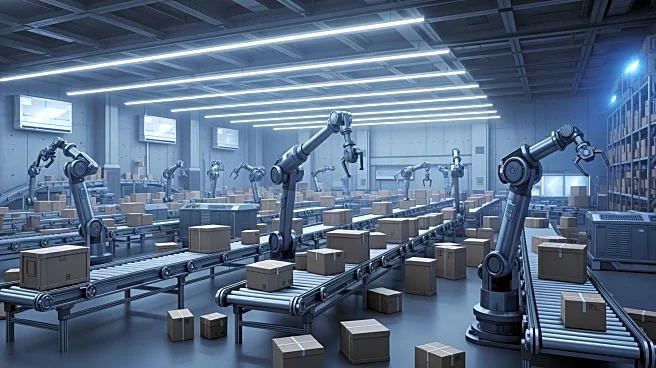What's Happening?
In the current landscape of global trade, supply chain disruptions have become a persistent challenge for manufacturers and retailers. The integration of automated supply chains is emerging as a critical strategy to address these challenges. Companies
that invest in real-time visibility and automated orchestration are transforming their operations into agile ecosystems, allowing them to respond swiftly to disruptions. This shift is driven by factors such as climate-related events, skilled labor shortages, and digital infrastructure gaps. Organizations that prioritize automation and integration are outperforming those that rely on outdated, manual processes. According to a report, companies with automated supply chains have consistently outperformed the market, highlighting the importance of agility and visibility in maintaining operational resilience.
Why It's Important?
The significance of automated supply chains lies in their ability to turn disruptions into competitive advantages. As companies face ongoing challenges such as tariffs, extreme weather events, and labor shortages, those with integrated and automated systems are better positioned to adapt and thrive. This transformation is crucial for maintaining customer trust and safeguarding margins. Automated supply chains enable real-time decision-making, allowing businesses to stabilize operations and strengthen relationships with stakeholders. The shift from cost centers to strategic assets is essential for companies aiming to maintain market leadership and seize emerging opportunities. The broader impact on U.S. industries includes enhanced operational resilience and improved investor confidence, as companies demonstrate their ability to navigate uncertainties effectively.
What's Next?
Looking ahead, companies that continue to invest in connected ecosystems and supplier diversification will be better equipped to handle future disruptions. The focus on agility and visibility will remain a business imperative, ensuring that organizations can respond to shocks and capitalize on new opportunities. As the decade progresses, the importance of automated supply chain orchestration will grow, with businesses prioritizing real-time pricing, transparent reporting, and supplier diversification. The ongoing evolution of supply chains will require a balance between cross-functional alignment, workforce training, and a cultural commitment to operational agility. Companies that embrace these changes will not only stabilize their operations but also enhance their competitive positioning in the market.
Beyond the Headlines
The deeper implications of automated supply chains extend to ethical and cultural dimensions. As companies invest in technology and automation, there is a growing need to address the skills gap in the workforce. Ensuring that employees are equipped with the necessary technological skills is crucial for successful implementation. Additionally, the shift towards automation raises questions about the future of labor in industries reliant on manual processes. Companies must navigate these challenges while maintaining transparency and ethical practices in their operations. The long-term impact of automated supply chains may also influence cultural shifts in how businesses approach supply chain management, emphasizing the importance of agility and resilience in a rapidly changing world.

















